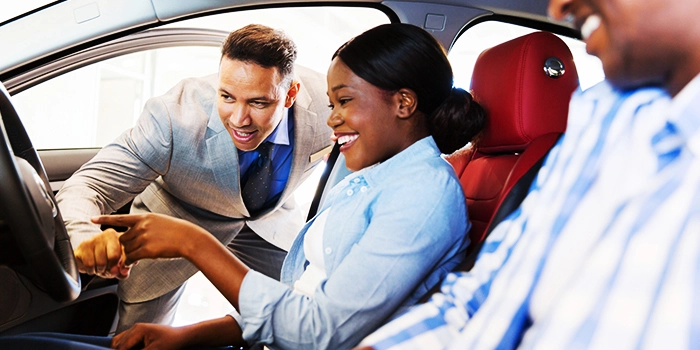6 Car-Buying Mistakes to Avoid


Buying a car can be both exciting and stressful. Knowing what to do— and what not to do – when buying a car, whether it’s new or used, can be intimidating. It’s fun to shop for a vehicle that you’ll enjoy driving, but your new ride also needs to be safe, reliable and within your budget. Paying attention to tips for buying a new car can help you make good decisions during this process. So, as you search for your new set of wheels, avoid these car buying mistakes to keep safety and savings as your top priorities.
Getting distracted by style and flash is a common car-buying mistake, but prioritizing car insurance and safety is crucial. Car safety varies from model to model, and choosing certain vehicles could mean compromising your safety. Data shows the risk for accidents is higher when you’re driving a sports car or small vehicle. In fact, sports cars have the highest deadly accident rate at 4.6 cars per billion vehicle miles, while subcompact cars clocked in at a rate of around 4.5 cars per billion vehicle miles — nearly double the average. Instead of buying one of these cars, consider an SUV. Crash rates are lower for drivers in SUVs and other large vehicles.
A deal is only good if it’s attached to a trustworthy car. Be sure to thoroughly research the vehicle models you’re considering before you buy. If a deal seems too good to be true, it probably is — and buying a too-cheap car might end up being a financial mistake if you have to make frequent trips to the repair shop. You may find that a more reliable vehicle is not much more expensive than others may be.
Dealerships often try to sell extras to consumers such as fabric protection, paint protection or rustproofing. Don’t waste your money. Vehicle bodies are already coated to protect against rust. And remember, you can use inexpensive, quality, off-the-shelf products to wash and wax the car and to keep the upholstery clean and free of stains. A little elbow grease can mean a lot of savings.
When you’re looking to buy a car, do careful research to find the right car insurance policy for you. First, look into the cost of insurance for the particular car you’re interested in. Second, remember that accidents and violations, as well as your age, can affect the premium you pay for your insurance. Your Farm Bureau agent can help you explore types of coverage and available discounts, both of which will affect your premium. Make the smart choice when you’re protecting your new investment.
Buying a used car can be a way to get a reliable vehicle, as older vehicles tend to have lower car prices. But getting behind the wheel of a model that’s more than 20 years old could pose safety risks, especially since these models are less likely to have features such as electronic stability control — which helps drivers maintain control on curves and slippery roads — and side airbags. If you decide to buy a used car, make sure you prioritize safety features in your search.
Even the most reliable vehicle can fail its driver if not properly maintained. Before buying a used vehicle, have it checked out by a mechanic familiar with diagnostic work. A good mechanic will identify whether the car has been in a significant accident or has a costly problem that could impact your purchase price. Be sure to request a written report of the car’s condition and use it in your price negotiations with the seller.
Don’t forget to protect your car purchase with adequate car insurance coverage. Connect with a Farm Bureau agent today to get the right policy for your needs.